The Institute for Health Policy and Practice's efforts in the area of Health Law and Policy advances effective health policy through education about and analysis of key legal issues that impact health and healthcare. The Institute provides resources including training, technical assistance and education related to policy and regulatory issues impacting healthcare in New Hampshire and beyond, and conducts evidenced-based research in the area of health policy.
For more information, contact Deborah Fournier at Deborah.Fournier@unh.edu.
Projects and Initiatives
Data and Policy Briefs
The Institute for Health Policy and Practice has released a series of data and policy briefs that seek to inform current conversations about health reform happening across the state.
- Brief #9 Covering the Care: Health Insurance Coverage in New Hampshire | 2023 Update
- Brief #8 Covering the Care: Health Insurance Coverage in New Hampshire, 2021 Update
- Brief #7 Covering the Care: Legal Update, December 2020
- Brief #6 Covering the Care: Health Insurance Coverage in New Hampshire, 2020 Update
- Brief #5 Covering the Care: Health Insurance Coverage in New Hampshire | 2019 Update
- Brief #4 Covering the Care: Medicaid, Work, and Community Engagement
- Brief #3 Covering the Care: Cost Sharing Reductions in NH
- Brief #2 Covering the Care: A Focus on the NH Marketplace
- Brief #1 Covering the Care: Health Insurance Coverage in New Hampshire
Policy Analysis and Summaries
- Legal Update | March 2, 2022: Legal Update - OIG Advisory Opinion on Contingency Management
HHS OIG Issues Fraud and Abuse Advisory Opinion on Contingency Management/Patient Incentive Program.
At long last, health care providers and suppliers seeking to use patient incentives for contingency management to support evidenced based treatment for substance use disorder patients have guidance on how to minimize risk of fraud and abuse. Advisory Opinion, Office of Inspector General (OIG), posted March 2, 2022. Read about the risks, compliance tips and details. - Interview | September 2021: NH's Healthcare System: ReBuilding for Tomorrow
Q&A with Endowment for Health President, Yvonne Goldsberry and Lucy Hodder, Professor of Law and Director of Health Law and Policy at the UNH Institute for Health Policy and Practice, talking about the reBuild Health initiative and its priorities.
With rising costs and a complex mix of different players involved in the delivery of care, how can New Hampshire create a trusted, sustainable and equitable healthcare system? - Presentation | January 19, 2021: SAMHSA 42 CFR Part 2 Revised Rule: HITEQ Highlights Webinar
- Presentation | January 11, 2021: Budget and Bagels: Key Health Policy Issues Impacting Budget and Health Care Costs in 2021
- Policy Brief: NH's Medicaid Work and Community Engagement Requirement
- Policy Brief: The New ERISA Rules on Association Health Plans and What they mean for New Hampshire: Brief Q&A
- Presentation | May 20, 2019: Hospital Mergers Regulatory Review for NH Senate Judiciary
Health Law & Policy Roundtable: The 4th Trimester: Closing Gaps in Care Through Policy and Planning
Thursday, September 25, 2025
Our in‑person event at the University of New Hampshire Franklin Pierce School of Law brought together practitioners, policymakers, and community members for a thoughtful discussion on the “4th Trimester”, the critical postpartum period following childbirth. Participants explored what supports new parents need, which services were missing, and how New Hampshire could strengthen systems to better meet families’ needs.
The session focused on identifying service gaps, sharing lived experiences and professional insights, and considering potential policy and programmatic solutions. Attendees engaged with experts in the field and contributed to a meaningful conversation about how to improve postpartum supports across the state.

Health Law & Policy Roundtable: New Hampshire Healthcare Consumer Protection Entities
Monday, June 16, 2025
Our in‑person Health Law and Policy Roundtable brought together professionals from across the region for a dynamic discussion on how consumer protection entities shape health law and policy. Held at the UNH School of Law, the event created space for participants to share insights, explore real‑world challenges, and examine the evolving role of consumer protection in the healthcare landscape.
Industry experts offered valuable perspectives on regulatory trends and enforcement practices, while attendees had the opportunity to connect, exchange experiences, and strengthen professional networks. The session provided a meaningful look at current developments in health law and policy and fostered thoughtful dialogue among practitioners committed to advancing consumer protection in healthcare.
Health Law & Policy 2024 Annual Symposium Affordable & Equitable Healthcare: Mapping a Way Forward
Friday, February 23, 2024
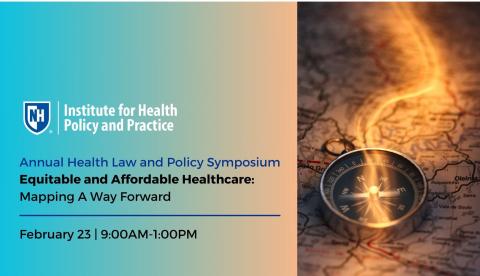
In February 2024, participants ranging from representatives of insurance carriers to hospitals attended IHPP's annual HL&P Symposium, ‘Equitable and Affordable Healthcare: Mapping a Way Forward
The first half of the gathering examined trends in national and state healthcare cost data, affordability as a component of inequity in healthcare, and factors that could be driving costs. Click here to review the slide deck.
The second half of the gathering featured interactive break-out groups, in which participants were assigned a category of healthcare cost policy: transparency, cost, and affordability. Each group reviewed, discussed, and selected one policy option from a menu of curated, state policy options within particular parameters. Click here to see the menu of policy options and their descriptions
The break-out groups fully utilized an hour to do their work and presented their selections to the entire audience at the end.
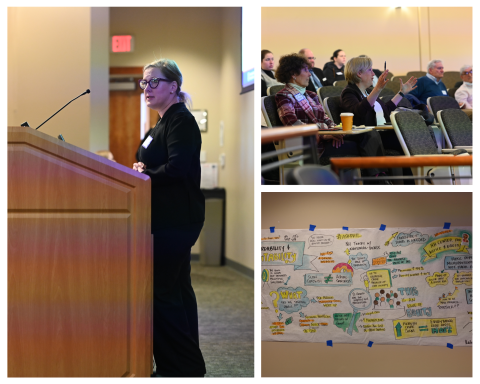
The Legal Impact: Medicaid Changes and Hospital Mergers
UNH Franklin Pierce School of Law, Podcast Series
May 16, 2023
Professor Lucy Hodder discusses the end of continuous Medicaid enrollment from the COVID-19 public health emergency and the impact of hospital mergers in New Hampshire. (Produced and Hosted by A J. Kierstead)
Riverbend 2022 Champions for Mental Health
Awards
Honoring Lucy C. Hodder
Equitable and Affordable Healthcare: A shared Responsibility
June 22, 2022

Rising health costs and problems with affordability are impacting individuals and families and disrupting healthcare access across the country and in New Hampshire. Over 200 participants joined a discussion on what can be done to make healthcare equitable and affordable in New Hampshire.
Healthcare Sustainability: perspectives on cost, affordability, and access
June 16, 2021

UNH Franklin Pierce School of Law and the Institute for Health Policy and Practice hosted a session with three national experts to discuss:
- Why we need to address increasing health costs burdening families and business
- What can be done to make healthcare more affordable and sustainable?
- How stakeholders are activating across the country and across sectors to address escalating health care costs
- How to empower employers to improve access and affordability
- Goals for transforming misaligned incentives for a more equitable health care system
Jo Porter, Director of the Institute for Health Policy and Practice, kicked-off the event and welcomed attendees.
Lucy Hodder, Director of Health Law and Policy Programs and Professor of Law, UNH Franklin Pierce School of Law and the Institute for Health Policy and Practice, introduced the event and described how the COVID 19 pandemic illustrates why collaboration and trust are key to having a system as complex as healthcare work effectively, and why oversight is needed to assure our resources are used equitably, efficiently, and effectively.
Hodder_Lucy_UNH_IHPP_Overview UNH Healthcare Sustainability June 2021
Chris Koller, President, Milbank Memorial Fund, spoke about why we need to address increasing health costs burdening families and businesses, and what is being done by stakeholder coalitions to make healthcare more affordable and sustainable in other states across New England.
Koller_Chris_Milbank_UNH Healthcare Sustainability June 2021
Gloria Sachdev, President and CEO, Employer’s Forum Indiana, spoke about how to empower employers to improve access and affordability, and the reasons for and impact of the RAND studies on hospital prices.
Sachdev_Gloria_EFIndiana_UNH Healthcare Sustainability June 2021
Eliot Fishman, Senior Director of Health Policy, FamiliesUSA, discussed the impact on families of high health costs and goals for transforming misaligned incentives for a more equitable health care system.
Fishman_Eliot_FamiliesUSA_UNH Healthcare Sustainability June 2021
Event Audio-Podcast: Healthcare Sustainability June 16,2021
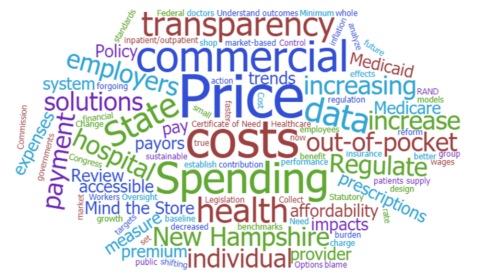
Support for this event provided by

Through a Different Lens: NH Citizens Health Initiative Annual Symposium
September 29, 2020
Julie Rovner, noted health journalist and Chief Washington Correspondent for Kaiser Health News, outlined key factors impacting the current state of our health care system and what to watch for as the election and Supreme Court appointments and challenges to the ACA unfold over the next few months.
The NH Citizens Health Initiative annual Symposium on Tuesday, September 29 provided insights on the latest national health policy topics, and attendees discussed how to improve health care systems in New Hampshire. Lucy Hodder, director of Health Law and Policy at UNH Franklin Pierce School of Law and IHPP moderated the discussion and led the Question and Answer session.
Attendees hailed from a variety of disciplines, including health care organizations, payer organizations, public health organizations, and more. Jeanne Ryer, Director of the NH Citizens Health Initiative, recognized 15 years of success by thanking the hard work and support of the NH CHI staff and their many partners across the state and beyond.
Jo Porter, director of the Institute for Health Policy and Practice (IHPP) framed the key health policy themes for facilitated small-group breakout sessions to discuss questions raised by Julie Rovner’s presentation. In these sessions, participants explored the changes to NH’s health care system in 2020, identified opportunities for impacting the future of NH health care, and crafted actionable individual and collective next steps.
Health Coverage for All: What does that mean and what are the implications?
July 29, 2020
The webinar conversation about health coverage for all and the policy implications of the debate as the nation recovers from COVID-19 was co-hosted by Health Law and Policy Programs at UNH Law, the Institute for Health Policy and Practice and The Warren B. Rudman Center, in partnership with Granite State Progress and the New Hampshire Medical Society. Support for the event was generously provided by the Peter G. Peterson Foundation and the Endowment for Health.
Lucy Hodder, Professor of Law at UNH Franklin Pierce School of Law and the Director of Health Law and Policy Programs for the College of Health and Human Services, Institute for Health Policy and Practice and Robert L. Bixby, Executive Director of The Concord Coalition moderated the panel of experts.
Panelists included Charles Blahous, the J. Fish and Lillian F. Smith Chair and senior research strategist at the Mercatus Center at George Mason University, Patrick Ho, MD, MPH, president of the New Hampshire Psychiatric Society and chief resident in psychiatry at Dartmouth-Hitchcock, and Margarida Jorge, executive director of Health Care for America Now (HCAN).
The Shifting Health Care landscape
June 11-12, 2020 | 2-Part Series
IHPP hosted a 2-day virtual session to better understand the consumer experience and the State’s response to the COVID-19 pandemic.

June 11: The Consumer Experience and State Policy Responses
On day 1 we heard fromLynn Quincy, Director of the Healthcare Value Hub at Altarum, and Trish Riley, Executive Director of the National Academy for State Health Policy (NASHP).
June 12: Engaging New Hampshire on Access and Affordability
On day 2 we hosted a facilitated discussion with key stakeholders from New Hampshire's Health Care system. We heard from Bobbie D Bagley, Director, City of Nashua Division of Public Health and Community Services, and Member, Governor’s COVID-19 Equity Response Team, Michelle McEwen, President/CEO of Speare Memorial Hospital and Member, Stakeholder Advisory Board, Governor’s Office for Emergency Relief and Recovery, Zandra Rice Hawkins, Executive Director of Granite State Progress, Kristine Stoddard, NH Director of Public Policy at Bi-State Primary Care Association, Adam Varley, Shareholder at Rath, Young and Pignatelli, P.C., and Marie Ramas, MD, Lamprey Health Care
Health Care Costs: Key Federal and State Strategies
Friday April 5, 2019
Last Friday, UNH School of Law hosted a discussion of the nation's health care system, including federal and state responses and strategies to address cost growth.
US Senator Maggie Hassan was the keynote speaker, discussing federal strategies, health cost hearings before the Senate Committee on Health, Education, Labor and Pensions, legislation to combat “surprise billing”, and the importance of advocacy.
Lucy Hodder, Director of Health Law and Policy Programs at UNH, moderated the panel of health policy experts including Joseph R. Antos, Ph.D., the American Enterprise Institute, Trish Riley, Executive Director of the National Academy for State Health Policy, and John E. McDonough, DrPH, MPA, Harvard T.H.Chan School of Public Health. The panel identified key trends in health cost growth, outlined key causes, discussed strategic solutions at the community, state and federal level, and debated policy options. Bob Bixby, Executive Director of the Concord Coalition, fielded questions from the audience and explained key budget pressures impacting the health care system.
The event was co-hosted by the Concord Coalition, the Warren Rudman Center for Justice, Leadership and Public Service at UNH School of Law, and Health Law and Policy Programs at UNH Law, Institute for Health Policy and Practice. The event was sponsored by the Peter G. Peterson Foundation.
A program booklet will follow.
Click below to listen to the podcast


3-Part Training on HIPAA, 42 CFR Part 2 and Patient Confidentiality
Developed and Presented by Lucy Hodder
Network4Health (IDN 4), Connections for Health (IDN 6), and Creating Connections New Hampshire hosted a series on patient/client confidentiality and 42 CFR Part 2. The 3 interactive sessions combined some lecture with conversation, Q&A’s, and hypothetical situations to give attendees as much information as possible on changes and developments in the privacy of substance use disorder treatment records, and how these privacy rules effect day to day work.
This series is ideal for SUD and mental health practitioners, as well as those offering critical supports that operate in an integrated world of practice where sharing information may be important to the client’s recovery. Refresh your understanding of the rules in action, share your questions and concerns, integrate solutions into your practice goals, and develop ideas on how to support your team and those in recovery while protecting against stigma in practice.
42 CFR Part 2 – Session 1: Confidentiality of Substance Use Disorder Patient Records: 42 CFR Part 2 Highlights – What do you need to know?
42 CFR Part 2 – Session 2: Sharing Information while protecting privacy as we communicate along the continuum of care
42 CFR Part 2 – Session 3: Training on the privacy of Health and sud Records: Important changes on the federal and state Level coming to hipaa/Part 2 that are important to substance use privacy
Improving Clinical Communication for Student Mental Health
FERPA, HIPAA, SUD confidentiality overview
Multiple state and federal laws protect the privacy of health and substance use disorder treatment information and impact communications about patients between providers of health services, including school nurses and pediatricians. The following brief summaries of FERPA, HIPAA Privacy Rule and 42 CFR Part 2 were created to help support “Improving Community-Wide Communications for Students”, a program for school nurses, school administrators and primary care providers. FERPA, the Family Educational Rights and Privacy Act, protects student education records. HIPAA, the Health Insurance Portability and Accountability Act and its Privacy Rule, protects private health information. 42 CFR Part 2 protects confidential substance use disorder treatment records.
Substance Use Disorder Confidentiality and Updates to 42 CFR Part 2: A Two-Phase Series
Lucy Hodder, JD and Lauren LaRochelle, JD, discuss the new and updated 42 CFR Part 2 rules protecting the confidentiality of Substance Use Disorder treatment information. These webinars are intended for SUD providers and their staff, particularly the NH Doorways and others receiving SOR funding. The webinars include an overview of patient information confidentiality rules, recent changes to 42 CFR Part 2, exceptions, compliance tips during COVID-19, applications to telehealth, and hypotheticals.
SUD Confidentiality – Overview and Update for SOR and SUD providers: Introduction (Phase 1)
SUD Confidentiality Rules in Practice – COVID 19, Telehealth, Hypotheticals and More (Phase 2)
Privacy and Security: Know the Rules for Communication of Behavioral Health Information
January 27, 2021
Lucy Hodder presented and moderated this webinar as part of the Overcoming Obstacles Webinar Series hosted by the American Medical Association's Behavioral Health Integration (BHI) Collaborative. This interactive webinar provided an overview of the current behavioral health privacy and security landscape, reviewing what is safe, secure and permissible under applicable federal laws and regulations such as CFR 42 Part 2 and HIPAA.
SAMHSA 42 CFR Part 2 Revised: Key Points for Health Centers on Rules Changes, What they Mean, and Health IT Considerations
January 19, 2021
Lucy Hodder, Director of Health Law and Policy at UNH Franklin Pierce School of Law, and Lauren LaRochelle JD, IHPP, presented this webinar as part of the Health Information Technology, Evaluation, and Quality Center (HITEQ) national training series on privacy and security for health centers. The HITEQ Center is a HRSA-funded National Training and Technical Assistance Partner (NTTAPs) that collaborates with HRSA partners including Health Center Controlled Networks, Primary Care Associations and other NTTAPs to engage health centers in the optimization of health IT to address key health center needs. This interactive webinar provided an overview of changes to substance use disorder information privacy (42 CFR Part 2) and other information and interoperability rules. Also presenting was the Center of Excellence for Protected Health Information.
2018 Substance Use Confidentiality Bootcamp
On March 20 and 27, 2018 the Health Law and Policy team hosted two sessions with the Department of Health and Human Services on the privacy of substance use disorder records and 42 CFR Part 2. The technical assistance sessions helped participants, including members of New Hampshire's DSRIP waiver Integrated Delivery Networks, managed care organizations, providers, data teams, and the State of New Hampshire evaluate appropriate regulatory pathways to allow for integrated care, treatment, and evaluation. Approximately 70 people participated during each session. Session activities included technical assistance on Part 2 and the new privacy regulations, information exchange mapping in breakout groups, a review of 42 CFR Part 2 and updates from the 2018 Final Rule.
2017 Substance Use Confidentiality Bootcamp
A Health Law and Policy team provided technical assistance to 6 of the 7 Integrated Delivery Networks in the form of educational and interprofessional bootcamps between May 15 and July 17, 2017 focusing on helping the IDNs to implement the new 42 CFR Part 2 regulations consistent with their integrated behavioral health practice goals and patient flow models. Approximately 35 members of the IDN teams attended the boot camp sessions, along with representatives from DHHS. The Bootcamp was a combination of in-person guided meetings, webinars, and IDN team-based homework to provide technical assistance to Integrated Delivery Networks in a compressed period of events between May 15 and July 17, 2017. The group produced draft policies and forms, a “work book” for implementation, and numerous educational guides.
- Substance Use Disorder Privacy Workbook: 42 CFR Part 2
- Data Exchange Identifying Questions
- Audit and Evaluation (b) Guide
- Audit and Evaluation (c) Guide
- QSO Guide
- Part 2 Definitions
- QSO Worksheet
- IDN Bootcamp Intro PowerPoint
- IDN Bootcamp Session 1 PowerPoint
- IDN Bootcamp Session 2 PowerPoint
- IDN Bootcamp Session 3 PowerPoint
- Worksheet 1
- Worksheet 2
- QSOA Sample Agreement
- Disclosure Chart
2023 Resource Guide: How to Access Mental Health and Substance Use Disorder Benefits
The UNH Franklin Pierce School of Law, Institute for Health Policy and Practice in collaboration with New Futures released the 2023 updated Resource Guide for Consumers: How to Access Mental Health and Substance Use Disorder Benefits.
Download the 2023 Resource guide
Getting health insurance in a time of need can seem overwhelming. To help individuals and families obtain needed care, the Guide provides detailed information on how to navigate health insurance coverage for mental health and substance use disorders. The Guide provides a basic explanation of how to find treatment, enroll in health insurance, make sure treatment is covered and paid for, and appeal when coverage is denied. It also includes a detailed section intended to assist providers in helping their clients and patients navigate this process.
The 2023 Guide is updated and enhanced to reflect changes in the law and delivery system, particularly as it relates to benefits for children and the designation of 988 as the new three-digit dialing code for the nationwide Suicide and Crisis Lifeline.
Accessing Mental Health & Substance Use Disorder Benefits Webinar
Friday, April 24, 2020
In this webinar, representatives from UNH Law/IHPP, New Futures, and the N.H. Department of Insurance reviewed the new Resource Guide and discussed how it can help individuals and families access needed treatment services. Specifically, we addressed: What’s new and changed in the Resource Guide, who do you contact with problems or questions, and tools and tips for accessing health insurance and treatment during and after COVID-19.
40th Annual Health Law Professors Conference
Lucy Hodder attended the 40th Annual Health Law Professors Conference in Atlanta, Georgia, June 8-9, 2017. She was a panelist for the Health Care Financing and Regulation: Developments in Mental Health Parity and Addiction Equity: Enforcement, Guidance, and Implementation session.
Article by Lucy Hodder
Medicare and Special Enrollment Periods, Employment Sponsored Insurance, Marketplace & Coverage Options
Join the New Hampshire Medicaid Department, the New Hampshire Insurance Department, New Hampshire Navigators, and University of New Hampshire’s Institute for Health Policy Practice (IHPP) in this recorded video discussion on open enrollment and special enrollment periods in New Hampshire.
Throughout this two-part video series, you will meet a panel of subject matter experts, be provided an overview of Medicare and the Marketplace, review different insurance coverage options available, and learn of situations in which a person would qualify for a Special Enrollment Period for insurance coverage, including the loss of Medicaid coverage and for individuals whose household income is expected to be no greater than 150% of the Federal Poverty Level.
Panel Members include:
- David Chorney, Deputy Director, New Hampshire Medicaid
- Keith Ballingall, President/New Hampshire Navigator, Health Market Connect
- Michelle Heaton, Director of Life and Health, New Hampshire Insurance Department
- Deb Fournier, Director of Health Law & Policy, UNH Institute for Health Policy and Practice
Medicaid Return to Operations Update - One Pager
New Hampshire Medicaid “Unwind” Transition – End of Continuous Enrollment Update | Small Stakeholder Meetings
may 12, 2023
NH DHHS and UNH IHPP jointly hosted a stakeholder webinar to discuss the ongoing transition to regular Medicaid operations and the end of continuous coverage period. The discussion focused on how to help enrollees navigate to affordable health insurance coverage and new developments as the transition continues.
March 31, 2023
NH DHHS and UNH IHPP jointly hosted a stakeholder webinar regarding the April 1 transition to regular Medicaid operations and the end of continuous coverage. The discussion focused on the latest resources available to help enrollees navigate to health insurance coverage, and information for community partners and beneficiaries about the transition.
February 24, 2023
NH DHHS and UNH IHPP jointly hosted a stakeholder webinar regarding the March 31, 2023 end of continuous coverage and the Medicaid transition (‘unwind’) in an effort to share the latest information and resources, as well as field questions from our community partners and beneficiaries.
Medicaid Continuous Coverage During the Pandemic: DHHS Strategies for Future Benefit Transitions | Stakeholder Meeting
January 19, 2022
IHPP Health Law and Policy programs hosted NH DHHS Medicaid leaders, including the Medicaid Director, Henry Lipman, Deputy Medicaid Director, Alyssa Cohen, and a cross-agency team, to discuss Medicaid continuous coverage transitions in 2022. Lucy Hodder, Director of Health Law and Policy Programs and Professor of Law, UNH Franklin Pierce School of Law and the Institute for Health Policy and Practice provided an introduction and overview. Deborah Fournier, Senior Associate, Health Law and Policy, facilitated the Q&A session at the end. Almost 300 attendees were present for the webinar.
The webinar focused on the following:
- Update on federal actions impacting Medicaid continuous coverage transitions
- Highlights from the Pink Letter and Update Your Address campaigns
- Review of inreach and outreach efforts to individuals, families and providers
- Information on how to get involved with outreach to beneficiaries
Medicaid to Schools: Technical Assistance Guide
December 2021
The purpose of this Medicaid to Schools (MTS) Technical Assistance Guide is to memorialize in one document the formal existing rules and guidance approved by New Hampshire Department of Health and Human Services for the Medicaid to Schools program. The Medicaid to Schools Program supports medical assistance services covered by the early and periodic screening, diagnostic and treatment benefit (EPSDT) by schools and education agencies to students. The MTS Technical Assistance Guide should be used as a primary resource for schools and MTS program staff. The administrative rules (He-W) and formal guidance in the form of “Information Bulletins” is referenced and categorized by topic. The user can link internally to sections for clarification and can link to external sources for clarification. This Technical Assistance Guide includes and summarizes only those resources that have been formally adopted by DHHS.
Each section of this Technical Assistance Guide includes a summary of the applicable administrative rules promulgated by the Department for Medicaid to Schools services, as well as a reprint of the relevant portion of the rules.
This MTS Technical Assistance Guide also includes the guidance and Q&A documents published by the Department. The Department’s guidance is quoted directly in each section to ensure fidelity to the regulatory interpretations provided, although sections may have been moved and paragraphs numbered or renumbered. Please refer to the original guidance linked herein if you have questions. Each section includes a summary of the rule, the guidance, a restatement of the rule and a link to the Information Bulletin. Many subjects are linked, so a review of the table of contents is important.
This MTS Technical Assistance Guide was created and contributed to by Lucy Hodder, JD, Kelsi West, Victoria Forkus from Health Law and Policy Programs, IHPP and the DHHS Medicaid to Schools Team, with appreciation to members of the JSI New Hampshire team.
DHHS Preparation for End of Federal Public Health Emergency: Impact on Medicaid and other Benefits | Stakeholder Meeting
July 29,2021
IHPP Health law and policy programs hosted DHHS Medicaid leaders to learn about the pending Medicaid enrollment transition that will be triggered by the end of the federal Public Health Emergency.
The webinar focused on the following:
- Who will be impacted by the end of the Public Health Emergency?
- What to do to prepare beneficiaries for transitions in eligibility?
- What notices are beneficiaries receiving about their eligibility and the federal PHE?
- What resources are available to help providers, beneficiaries and families?
The Community Response to Medicaid Work and Community Engagement Requirements: Lessons from New Hampshire
Report released May 2020
UNH's Institute for Health Policy and Practice (IHPP) and Franklin Pierce School of Law have released a new report assessing New Hampshire’s Medicaid Work and Community Engagement Requirements and their impact on the state’s community providers.
When the Work and Community Engagement Requirements were first implemented in 2019, they were costly for many community health organizations and confusing for beneficiaries, according to the report, “The Community Response to Medicaid Work and Community Engagement Requirements: Lessons from New Hampshire,” which was funded in part by the Robert Wood Johnson Foundation. The work and community engagement requirements were suspended in July 2019 when implementation threated access to health insurance by thousands of Granite Staters.
The report reviews the history of the Work and Community Engagement Requirements (WACER), ending with the decision in the Philbrick v. Azar court case striking down the requirements. It also includes an assessment of the requirements’ substantial impact on community organizations, which were not predicted or fully assessed in the planning and implementation of the program.
The research study was supported by funding from the Robert Wood Johnson Foundation (grant #76038). The views expressed within the report do not necessarily reflect those of the Foundation.
July 2019 NH Medicaid Granite Advantage Program Update
The Commissioner of NH DHHS temporarily suspended the Granite Advantage work and community engagement requirement. The suspension will last until September 30, 2019. During the suspension period Granite Advantage beneficiaries will not lose coverage for failing to meet the work and community engagement requirement and do not need to report hours spent engaged in qualifying work or community engagement activities.
Read the July 2019 NH Medicaid Work Requirement Temporary Suspension memo.
Granite Advantage Program Roundtables
IHPP Health Law and Policy program hosted roundtable discussions with stakeholders on the Granite Advantage Program and the Work and Community Engagement Requirement.
- May 31, 2018 | NH Medicaid Work Requirement Roundtable
- January 23, 2019 | NH Medicaid Work Requirement Roundtable
- April 17, 2019 | NH Medicaid Work Requirement Roundtable
Additional information
Presentation on New Hampshire’s Work and Community Engagement Requirement and its impact on community services. By Lucy C. Hodder, Director of Health Law and Policy at UNH's Institute for Health Policy and Practice: American Society of Law, Medicine & Ethics (ASLME) 2019 NH Medicaid Work Requirement
Article by Lucy Hodder summarizing the federal court decision vacating Kentucky’s Medicaid waiver including its work and community engagement requirements and discussing what it might mean for New Hampshire: Stewart v. Azar- What Does It Mean For New Hampshire’s Medicaid Work and Community Engagement Requirement?
Medicaid One-Pagers
Jointly developed by the Institute for Health Policy and Practice and the NH Health Law and Policy Programs, the five overview documents below highlight the details of five state Medicaid programs - New Hampshire, Maine, Massachusetts, Rhode Island and Vermont. These overview documents were developed to provide a summary of each state’s population, currently eligibility guidelines, the history of each state’s program and more.
New Hampshire Medicaid Policy Today and Tomorrow: Focusing on Value, A Research Symposium
The New Hampshire Medicaid Program plays a key role in providing health insurance to people in NH and stabilizing our insurance market. Hosted by the UNH Health Law and Policy Programs/Institute for Health Policy and Practice at UNH, this Symposium featured an overview of NH Medicaid, research about the program's outcomes in managed care and with expansion populations, a review of value-based payment reform, and a discussion of key federal policy initiatives that may impact the future of the Medicaid Program.
Review the NH Medicaid Today and Tomorrow summary booklet
Videos from the symposium
Health Care Affordability
Lucy Hodder, JD, former Director of Health Law and Policy and Ned Helms, former director of the Institute for Health Policy and Practice are quoted in the New Hampshire voters push Democratic candidates on health care article by Amy Goldstein in the Washington post.
Regulatory Barriers to Value-Based Payment Reform in NH: Stage 1
- Regulatory Barriers to Value-Based Payment Reform: Stage 1 Executive Summary
- Key NH and Federal Statutes Regulating Health Care Delivery and Payment
Transparency and All-Payer Claims
Model All-Payer Database Legislation
The Health Law and Policy team has worked to enhance the public availability of critical healthcare claims data needed for the development of innovative public health and policy strategies across the country. With the APCD Council, the team published “Model All-Payer Claims Database Legislation.” The model legislation provides guidance for developing legislation for state all-payer claims database systems. The Health Law and Policy Team has helped draft briefs for SCOTUS comments to federal meetings and information for states and employers regarding the impact of the Gobeille decision on All Payer Claims Database efforts.
The College of Health and Human Services co-sponsors an event with the Northern New England Association of Healthcare Executives. “Shaping the Future: Leadership and Public Policy in Health Care” brings together students, alumni and external health and human service partners to discuss the health systems’ role in formulating public policy, fostering talent management and bench strength within health care organizations, and improving mental health and addictions services for patients.
Health Leader Forge has posted a podcast of the panel discussions and keynote presentation.
Extended Coverage for Pregnant Women Rescue Plan
May 19, 2021
Developing Plans of Safe and Supportive Care for High Risk Families in New Hampshire: Legal Update, Supporting mothers and infants born exposed to substances
December 17, 2020
For additional background, tools and resources on New Hampshire’s POSC, please visit the NH Perinatal Substance Exposure Collaborative webpage.
What is a Plan of Safe Care? An Introduction to Best Practices for Mothers and Infants Exposed to Substances in New Hampshire
Developed by Lucy Hodder, JD, Director of Health Law and Policy, David Laflamme, PhD, MPH, Research Assistant Professor and State Maternal and Child Health Epidemiologist, this presentation and webinar were created to provide background information on Plans of Safe Care (POSC) as part of the work of the NH Governor's Commission on Alcohol and Other Drugs Perinatal Substance Exposure Task Force.
The goal is to inform providers and community organizations about Plans of Safe Care and NH's implementation process in order to connect new moms and families with supports and services when they leave the hospital.
For additional materials on Plans of Safe Care, please visit the NH Perinatal Substance Exposure Collaborative webpage.
Set it in Stone: Investing in 21st Century Broadband in New Hampshire to Secure Telehealth for All Residents
Written by Deborah H. Fournier, JD, Senior Associate, Health Law and Policy Programs, UNH Franklin Pierce School of Law, Institute for Health Policy and Practice, this paper highlights the need for New Hampshire to determine where it should invest broadband resources to close the digital divide that exists in the State between those who have internet access and those who do not; and equally as important, what modality of broadband infrastructure should be invested in to ensure equitable access to telehealth across New Hampshire and optimize broadband in the Granite State for the next 20-30 years.

The NH Purchasers Group on Health is a Coalition of public purchasers working to improve quality and efficient, effective healthcare and share best practices on areas of benefits, wellness, and contracts. Institute for Health Policy and Practice (IHPP) provides facilitation and staffing for NHPGH to advance their goals, apprise them of best practices and market data, and bring in expert resources on a project-specific basis. For more information about the NH Purchasers Group on Health, call (603) 862-1128 or email info@nhpgh.org.
The NH Hospital Scorecard is sponsored by the NH Purchasers Group on Health; it highlights the quality and cost of healthcare in our state, and is an effort to get the public and the systems that provide medical care involved in a conversation about what we can collectively do to improve quality and cost.
The Health Law & Policy Team partnered with New Hampshire’s Judicial Branch to support the Sequential Intercept Model (SIM) Mapping Workshops throughout all of the 10 counties in the state of New Hampshire.
SIM was developed as a conceptual model to assess available resources, determine gaps in services, and plan for reducing involvement with the criminal justice system with respect to the involvement of people with mental health and/or substance use disorders. SIM stakeholders include representatives from mental health and substance use disorder providers, law enforcement, pretrial services, courts, jails, community corrections, housing, health, social services, and those with lived experiences of interacting with the incarceral system and having a mental health or substance use disorder need. SIM workshops are two days long, with day one dedicated to mapping out the mental health and substance use disorder services and gaps in the county; day two is dedicated to breaking into priority groups aimed at tackling the most pressing opportunities for change in the county. Following participation in the workshop, an official report is written for each county. By early 2025, every county in New Hampshire will have hosted a SIM Workshop. The SIM reports for each county can be found below.
Resources and Publications
NH 988 Resource Guide for LGBTQIA+ Callers July 2025 - Supporting LGBTQIA+ Callers in Crisis Resource List
Supporting LGBTQIA+ Callers in Crisis Resource List
This document was created by the University of New Hampshire (UNH) Institute for Health Policy and Practice (IHPP) in July 2025. It is intended for use by the 988 Lifeline Centers in New Hampshire and serves as a resource list for callers who identify as Lesbian, Gay, Bisexual, Transgender, Queer/Questioning, Intersex, Asexual, and as other diverse gender and sexual identities (LGBTQIA+). The document is organized into the following categories. At the end of each category are resources that are specific to youth and/or families.

Covering the Care: Chronic conditions, including behavioral health, drive a significant proportion of high-utilizer emergency department visits in 2023.
January 2026
This data brief summarizes a retrospective analysis of commercial, New Hampshire Medicaid, and New Hampshire Medicare claims, examining common reasons for emergency department visits among children aged 0-18, adults aged 19-44, adults aged 45-64, and adults aged 65 years and older in calendar year 202

Covering the Care: The Fourth Trimester
January 2026
The weeks following the birth of a baby are often described as a time of extremes: profound joy paired with deep exhaustion, vulnerability, and adjustment. For birthing people, this period involves physical recovery from childbirth, dramatic hormonal shifts, disrupted sleep, learning to feed and care for an infant, and navigating major emotional changes. While some new parents have strong support systems, others face isolation, housing instability, or unsafe home environments. This critical 12-week period after birth is now widely known as the “fourth trimester.” Although the language is new, the reality is not. Across cultures and history, the postpartum period has been recognized as a time requiring focused care for both mother and baby. Yet within the U.S. medical system, postpartum support remains strikingly limited.

Covering the Care: Medical Debt: A Uniquely American Issue
January 2026
Healthcare is one of the most prominent issues facing Americans due to issues of affordability, access, and potential for debt. A July 2025 poll from Kaiser Family Foundation indicates that approximately half of U.S. adults say it is difficult to afford healthcare costs and about one third of adults say they have postponed care in the last year because of the cost. According to a 2024 New Hampshire specific survey, 69% of adults have delayed or gone without healthcare due to cost, 71% of adults have experienced a healthcare affordability issue in the past year, and more than 80% worry about affording healthcare in the future.
These healthcare affordability concerns are not limited to those who are uninsured. Six in ten insured adults worry about affording out-of-pocket costs not covered by insurance, such as co-pays and deductibles. Unexpected healthcare costs are a primary contributor to medical debt.

Covering the Care: Why Financial Resources Matter for Health
January 2026
Where people end up in the income and wealth distribution has a powerful and lasting influence on how healthy they are and how long they live. This is not just a story about poverty versus comfort. Across the entire population, health improves step by step as financial resources increase. Researchers call this pattern the health gradient.
This brief explains why that gradient exists. Drawing on decades of research from economics, public health, and social epidemiology, it shows how limited financial resources shape health through multiple pathways that unfold over different time horizons—from immediate consequences to cumulative effects that build over a lifetime.
Covering the Care: Why Financial Resources Matter for Health

Covering the Care: Utilization Rate Trends Among NH Older Adults Enrolled in Medicare Aged 65 and Over
January 2026
This data brief summarizes a retrospective analysis of New Hampshire Medicare Parts A and B claims, examining six-year (2018–2023) trends in utilization rates for selected medical services among adults aged 65 and older. It is the third and last of a three-part series of Covering the Care analytic reports exploring healthcare utilization trends in the state.
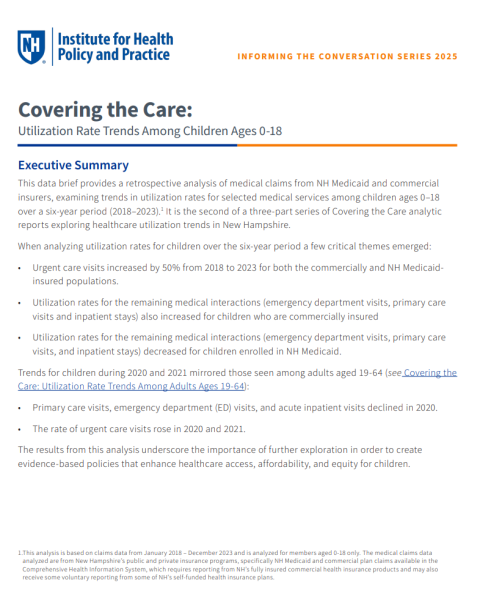
Covering the Care: Utilization Rate Trends Among Children Ages 0-18
December 2025
This data brief provides a retrospective analysis of medical claims from NH Medicaid and commercial insurers, examining trends in utilization rates for selected medical services among children ages 0–18 over a six-year period (2018–2023).1 It is the second of a three-part series of Covering the Care analytic reports exploring healthcare utilization trends in New Hampshire.
Covering the Care: Utilization Rate Trends Among Children Ages 0-18

Covering the Care: Utilization Rate Trends Among NH Older Adults Enrolled in Medicare Aged 65 and Over
January 2026
This data brief summarizes a retrospective analysis of New Hampshire Medicare Parts A and B claims, examining six-year (2018–2023) trends in utilization rates for selected medical services among adults aged 65 and older. It is the third and last of a three-part series of Covering the Care analytic reports exploring healthcare utilization trends in the state.

Covering the Care: Utilization Rate Trends Among Children Ages 0-18
December 2025
This data brief provides a retrospective analysis of medical claims from NH Medicaid and commercial insurers, examining trends in utilization rates for selected medical services among children ages 0–18 over a six-year period (2018–2023).1 It is the second of a three-part series of Covering the Care analytic reports exploring healthcare utilization trends in New Hampshire.
Covering the Care: Utilization Rate Trends Among Children Ages 0-18

Covering the Care: Utilization Rate Trends Among Adults Ages 19-64
November 2025
This data brief presents a retrospective analysis of available medical claims data from NH Medicaid, NH Medicare and commercial insurance plans focusing on the trends of utilization rates for chosen medical interactions over a six-year period (2018-2023) among adults ages 19 to 64. This brief is the first of a three-part series of Covering the Care analytic reports exploring healthcare utilization trends in New Hampshire.
Covering the Care: Utilization Rate Trends Among Adults Ages 19-64
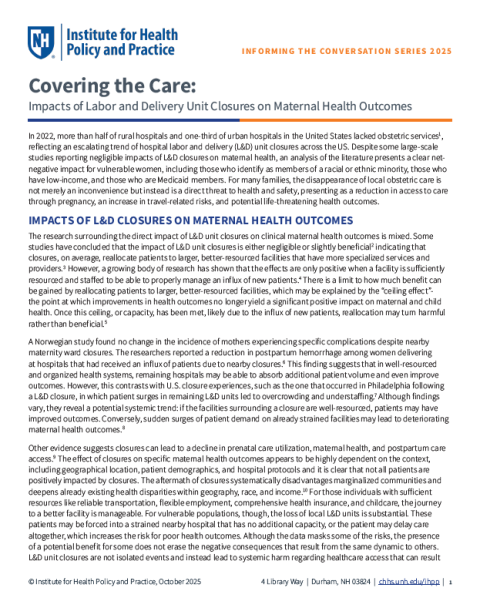
Covering the Care: Impacts of Labor and Delivery Unit Closures on Maternal Health Outcomes
2025
In 2022, more than half of rural hospitals and one-third of urban hospitals in the United States lacked obstetric services, reflecting an escalating trend of hospital labor and delivery (L&D) unit closures across the US. Despite some large-scale studies reporting negligible impacts of L&D closures on maternal health, an analysis of the literature presents a clear net-negative impact for vulnerable women, including those who identify as members of a racial or ethnic minority, those who have low-income, and those who are Medicaid members. For many families, the disappearance of local obstetric care is not merely an inconvenience but instead is a direct threat to health and safety, presenting as a reduction in access to care through pregnancy, an increase in travel-related risks, and potential life-threatening health outcomes.
Covering the Care: Impacts of Labor and Delivery Unit Closures on Maternal Health Outcomes

November 2025
The Institute for Health Policy and Practice (IHPP) of the University System of New Hampshire (USNH) contracted with Sarah Mason Eck of Scientific Health to provide evidence-based research on the effects of involvement in the criminal justice system with health outcomes.
The primary goal of this assignment was to identify, research, and review peer-reviewed, primary academic literature on studies examining how involvement with the correctional system impacts health outcomes.
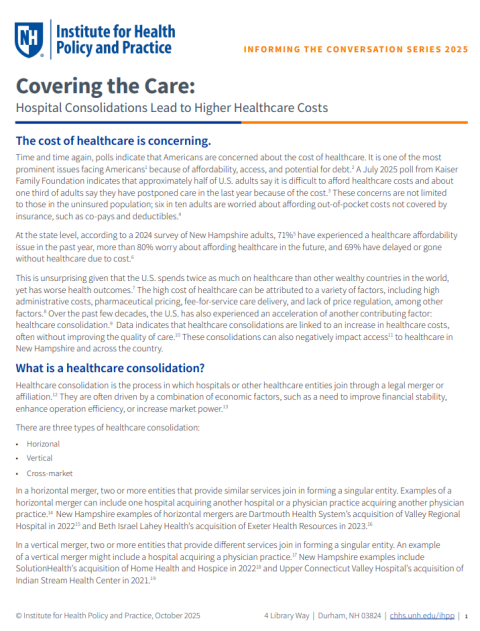
Covering the Care: Hospital Consolidations Lead to Higher Healthcare Costs
October 2025
Time and time again, polls indicate that Americans are concerned about the cost of healthcare. It is one of the most prominent issues facing Americans because of affordability, access, and potential for debt. A July 2025 poll from Kaiser Family Foundation indicates that approximately half of U.S. adults say it is difficult to afford healthcare costs and about one third of adults say they have postponed care in the last year because of the cost. These concerns are not limited to those in the uninsured population; six in ten adults are worried about affording out-of-pocket costs not covered by insurance, such as co-pays and deductibles.
At the state level, according to a 2024 survey of New Hampshire adults, 71% have experienced a healthcare affordability issue in the past year, more than 80% worry about affording healthcare in the future, and 69% have delayed or gone without healthcare due to cost.
This is unsurprising given that the U.S. spends twice as much on healthcare than other wealthy countries in the world, yet has worse health outcomes. The high cost of healthcare can be attributed to a variety of factors, including high administrative costs, pharmaceutical pricing, fee-for-service care delivery, and lack of price regulation, among other factors. Over the past few decades, the U.S. has also experienced an acceleration of another contributing factor: healthcare consolidation. Data indicates that healthcare consolidations are linked to an increase in healthcare costs, often without improving the quality of care. These consolidations can also negatively impact access to healthcare in New Hampshire and across the country.
Covering the Care: Hospital Consolidations Lead to Higher Healthcare Costs

Covering the Care: Pregnancy Tops the List of Highest Out-Of-Pocket Costs for NH’s Commercially Insured
February 2025
This data brief presents a retrospective analysis of available medical claims data from New Hampshire’s commercial insurance plans. This brief focuses on conditions with the highest average out-of-pocket costs paid by commercially insured members in 2022. It also examines how out-of-pocket costs for those conditions have changed over a seven-year period (2016-2022). The analysis is based on claims data from January 2016 – December 2022 and is analyzed at the overall population level and by member gender. It is part of a series of analytic briefs examining the rate of the most common health conditions and treatment costs for those respective conditions.

Covering the Care: Most Costly Health Conditions – Metabolic Disorders, Hemophilia, Cancers, and Transplants Top the List
February 2025
This data brief presents a retrospective analysis of available medical claims data from New Hampshire’s commercial, Medicaid, and Medicare insurance programs. This brief focuses on the conditions that incur the highest medical costs, regardless of their prevalence among the population. Metabolic disorders, hemophilia, certain cancers, and transplants were identified across all three payers as some of the costliest conditions. Most of these conditions have low prevalence and could, in some instances, be considered rare. There is variability in the prevalence of these conditions by payer type and there is a variability in the costs paid by payer type, with commercial insurance consistently having the highest costs. The analysis uses administrative medical claims data from January to December 2022.

Covering the Care: Pharmaceutical Utilization and Per-Member-Per-Month Costs
January 2025
This data brief presents a retrospective descriptive analysis of pharmaceutical utilization and its associated costs by utilizing available pharmacy claims data from three of New Hampshire’s insurance payers: commercial, NH Medicaid, and NH Medicare. The brief identifies the top ten drug classes by number of prescriptions filled and their per-member-per-month costs. The analysis is based on the most recent calendar year of pharmacy claims data available (January – December 2022).
Covering the Care: Pharmaceutical Utilization and Per-Member-Per-Month Costs
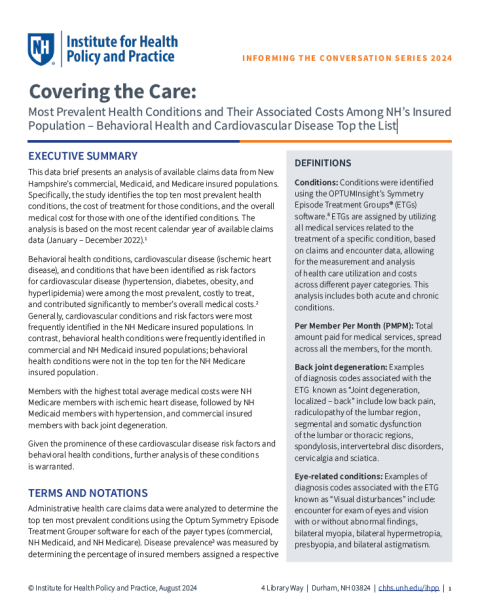
August 2024
This data brief presents an analysis of available claims data from New Hampshire’s commercial, Medicaid, and Medicare insured populations. Specifically, the study identifies the top ten most prevalent health conditions, the cost of treatment for those conditions, and the overall medical cost for those with one of the identified conditions. The analysis is based on the most recent calendar year of available claims data (January – December 2022).
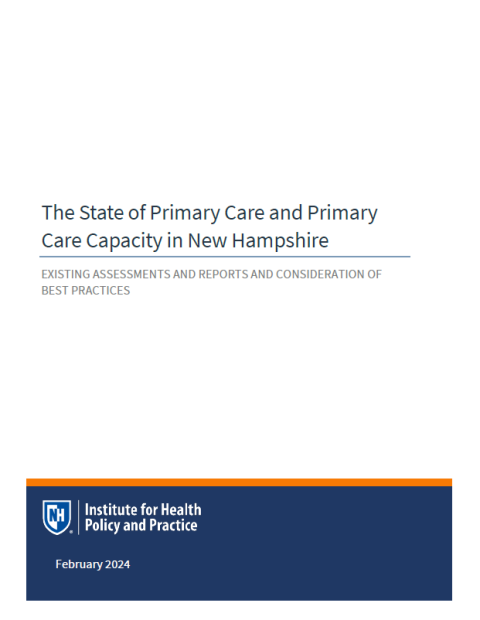
February 2024
The Institute for Health Policy and Practice (IHPP) of the College of Health and Human Services at the University of New Hampshire (UNH) contracted with Sarah Mason Eck of Scientific Health to provide a review of existing New Hampshire (NH) assessments and reports surrounding practices in primary care.
The primary goals of this assignment were to:
1. Review and synthesize data from within existing state, regional, and national assessments and reports regarding primary care and capacity in NH with a particular focus on infrastructure, access (barriers and utilization), clinical quality measures, provider workforce, and payment systems.
2. Review the literature for evidence-based best practices in primary health care, with a focus on primary care delivery models, payment methods, and spending measurement.
The State of Primary Care and Primary Care Capacity in New Hampshire
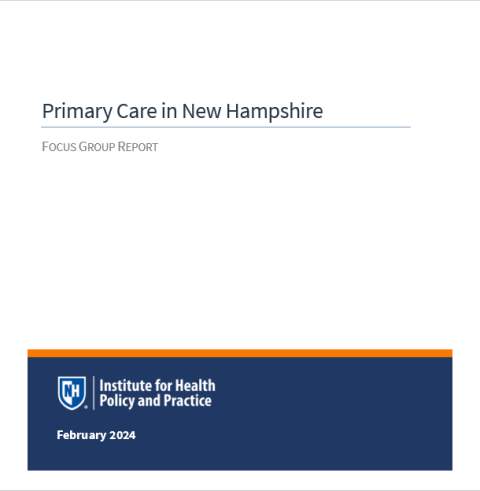
February 2024
As a part of the Endowment for Health’s comprehensive strategy to improve the health of the people in New Hampshire (NH), the foundation invests in the University of New Hampshire Institute for Health Policy and Practice Health (UNH IHPP) to research and inform statewide health law and policy. Specifically, funding in 2023 focused on the provision of primary care in NH, which IHPP addressed through two reports and a focus group. The reports included a landscape on existing best-practice literature in primary care and, a review of assessment tools for evaluating primary care services and delivery. This paper provides a summary and findings of the focus group.
Primary Care in New Hampshire Focus Group Report

July 2023
The UNH Franklin Pierce School of Law, Institute for Health Policy and Practice in collaboration with New Futures released the 2023 updated Resource Guide for Consumers: How to Access Mental Health and Substance Use Disorder Benefits.
2023 Resource Guide: How to Access Mental Health and Substance Use Disorder Benefits

February 2023
NH DHHS and UNH IHPP jointly hosted a stakeholder webinar regarding the March 31, 2023 end of continuous coverage and the Medicaid transition (‘unwind’) in an effort to share the latest information and resources, as well as field questions from our community partners and beneficiaries.
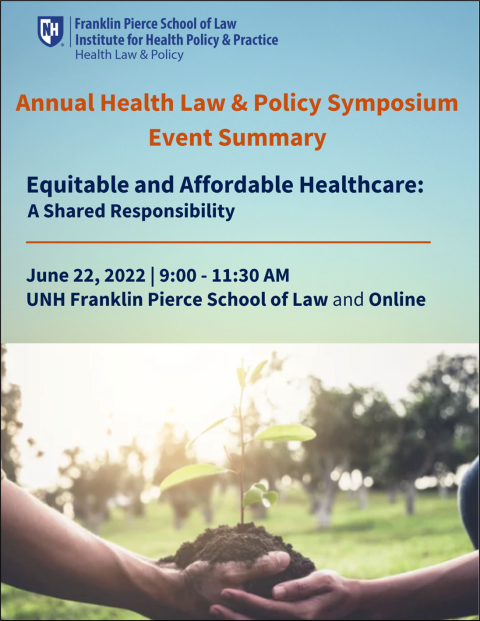
December 2022
At long last, health care providers and suppliers seeking to use patient incentives for contingency management to support evidenced based treatment for substance use disorder patients have guidance on how to minimize risk of fraud and abuse. Advisory Opinion, Office of Inspector General (OIG), posted March 2, 2022. Read about the risks, compliance tips and details.
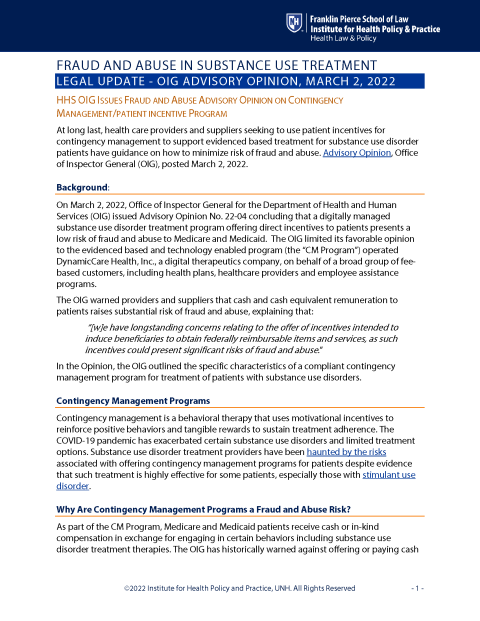
March 2022
At long last, health care providers and suppliers seeking to use patient incentives for contingency management to support evidenced based treatment for substance use disorder patients have guidance on how to minimize risk of fraud and abuse. Advisory Opinion, Office of Inspector General (OIG), posted March 2, 2022. Read about the risks, compliance tips and details.
Legal Update on Fraud and Abuse Opinion on Contingency Management Program UNH Law
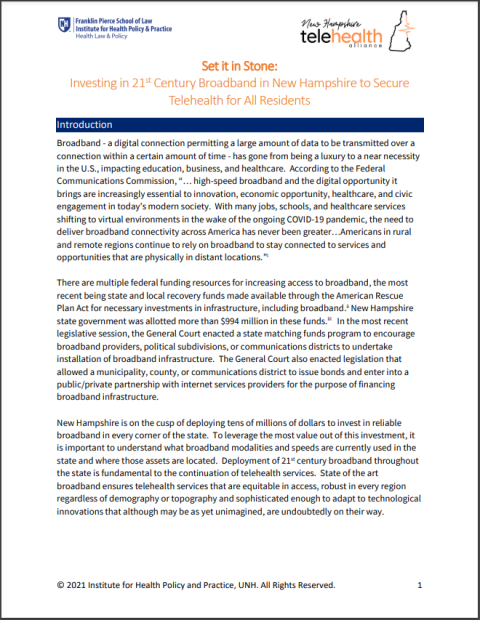
January 2021
Description: The paper highlights the need for New Hampshire to determine where it should invest broadband resources to close the digital divide that exists in the State between those who have internet access and those who do not; and equally as important, what modality of broadband infrastructure should be invested in to ensure equitable access to telehealth across New Hampshire and optimize broadband in the Granite State for the next 20-30 years.
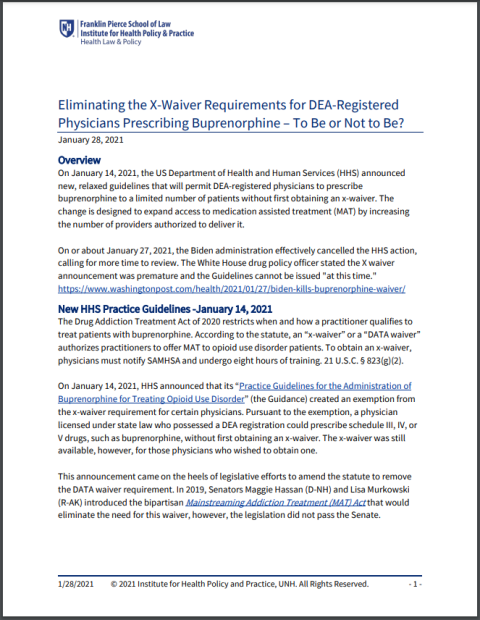
2021
Advance Child Tax Credits start July 2021 as part of the federal COVID-19 relief package. Find out what you need to know.
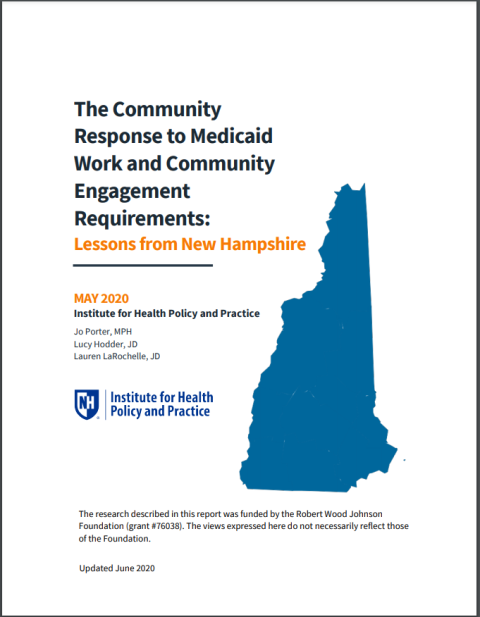
May 2020
As part of the Medicaid expansion adopted in New Hampshire, the New Hampshire Department of Health and Human Services received waiver approval from the Centers for Medicaid and Medicare Services to implement Work and Community Engagement Requirements (WACER). This project explores the impact of the implementation of WACER on operations and infrastructure of community organizations. As well as exploring the expectations of "effort" by providers and community organizations to engage beneficiaries in the requirements.
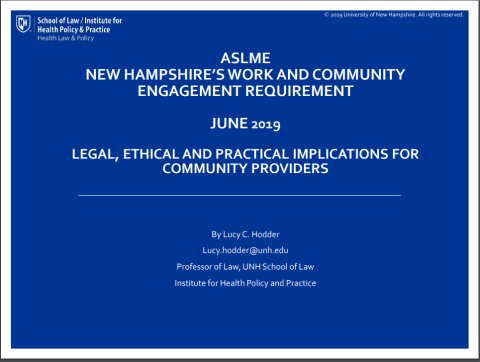
June 2019
American Society of Law, Medicine, & Ethics in this report details changes in Medicaid Expansion in NH, the Granite Advantage Program, and the procedural history of implementation of Medicaid Expansion and the Work and Community Engagement Requirement (WACER)
American Society of Law, Medicine & Ethics (ASLME) 2019 NH Medicaid Work Requirement
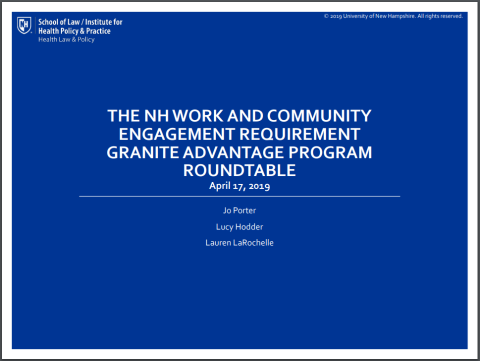
April 2019
In this program Granite Advantage rules updates are discussed along with updates on key outreach and planned outreach activities. Following is provider, member, and stakeholder feedback, ending with online resources and a discussion on the digital outreach campaign.
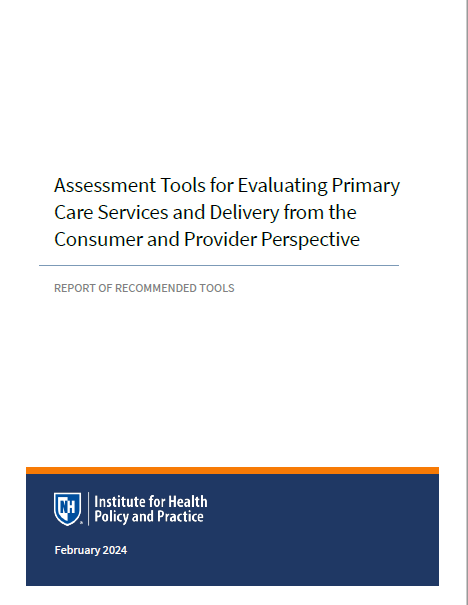
February 2024
Develop a synthesis of tools and recommendations for collecting data from patients and clinicians related to primary care services and care delivery. Create a report of recommended tools that have been used and validated, ideally with an appendix of the actual survey instruments when they are available and can be used either with permission or for a fee.

Covering the Care: Health Insurance Coverage in New Hampshire
Individuals risk experiencing unexpected and high medical costs and often forgo necessary care when they lack health insurance. According to research by the Kaiser Family Foundation, 20% of uninsured people went without care, and another 24% postponed care, due to cost in 2015.
Covering the Care: Health Insurance Coverage in New Hampshire

Covering the Care: A Focus on the NH Marketplace
This brief provides background about what the New Hampshire Health Insurance Marketplace is, how NH residents are receiving coverage made available through NH’s federally-facilitated Marketplace in 2017, and how coverage is being accessed by the New Hampshire Health Protection Program.

Covering the Care: Cost Sharing Reductions in NH
This brief illustrates the extent to which individuals enrolled in Qualified Health Plans (QHPs) on NH’s Health Insurance Marketplace received Cost Sharing Reductions (CSRs), based on the most recent available detailed data (period November 1, 2015 – February 1, 2016).i More about the Marketplace in New Hampshire can be found in the policy brief, “Covering the Care: A Focus on the NH Marketplace,” published in June 2017.

Covering the Care: Medicaid, Work, and Community Engagement
June 2018
Over the next twelve months, New Hampshire will transition to a new coverage model for the Medicaid expansion program (the “Granite Advantage Program”), and will implement a demonstration waiver including a work and community engagement requirement, approved for New Hampshire on May 7, 2018.1 This brief focuses on the population covered by the New Hampshire Medicaid program, with an emphasis on work status and income (for a description of Medicaid expansion in New Hampshire, see Covering the Care: A Focus on the NH Marketplace).

Covering the Care: Health Insurance Coverage in New Hampshire | 2019 Update
December 2019
This brief provides updates from the Insurance Coverage and Marketplace “Covering the Care Briefs” that were previously published.
Covering the Care: Health Insurance Coverage in New Hampshire | 2019 Update

Covering the Care: Health Insurance Coverage in New Hampshire | 2020 Update
December 2020
This brief provides updates from the Insurance Coverage and Marketplace “Covering the Care Briefs” that were previously published.
This update also includes a special section focused on premiums and deductibles in New Hampshire.
Covering the Care: Health Insurance Coverage in New Hampshire | 2020 Update

Covering the Care: Legal Update December 2020
December 2020
Courts are deciding cases impacting how we access health care and insurance in New Hampshire. This Legal Update summarizes key health care cases including challenges to the Affordable Care Act, Medicaid work and community engagement requirements, due process rights for people with acute mental illness, state authority to regulate pharmacy benefit managers, and access to reproductive health.
Covering the Care: Legal Update December 2020

Covering the Care: Health Insurance Coverage in New Hampshire | 2021 Update
August 2022
This brief provides updates from the Insurance Coverage and Marketplace “Covering the Care Briefs” that were previously published by IHPP, providing information about coverage in 2020 and 2021. Please see “NOTE” in data sources to explain date changes and what is included.
Covering the Care: Health Insurance Coverage in New Hampshire | 2021 Update

Covering the Care: Health Insurance Coverage in New Hampshire | 2023 Update
March 2024
This brief provides updates from the Insurance Coverage and Marketplace “Covering the Care Briefs”
that were previously published.
Covering the Care: Health Insurance Coverage in New Hampshire | 2023 Update

Covering the Care: Hospital Consolidations Lead to Higher Healthcare Costs
2025
Time and time again, polls indicate that Americans are concerned about the cost of healthcare. It is one of the most prominent issues facing Americans1 because of affordability, access, and potential for debt.2 A July 2025 poll from Kaiser Family Foundation indicates that approximately half of U.S. adults say it is difficult to afford healthcare costs and about one third of adults say they have postponed care in the last year because of the cost.3 These concerns are not limited to those in the uninsured population; six in ten adults are worried about affording out-of-pocket costs not covered by insurance, such as co-pays and deductibles.4
Covering the Care: Hospital Consolidations Lead to Higher Healthcare Costs
Visit Health Law and Policy's new resource: New Hampshire Health Policy Hub, for digestible health policy news that impacts New Hampshire and beyond!
This resource is written by IHPP's Health Law and Policy team and Deb Fournier, JD, Director of Health Law and Policy.